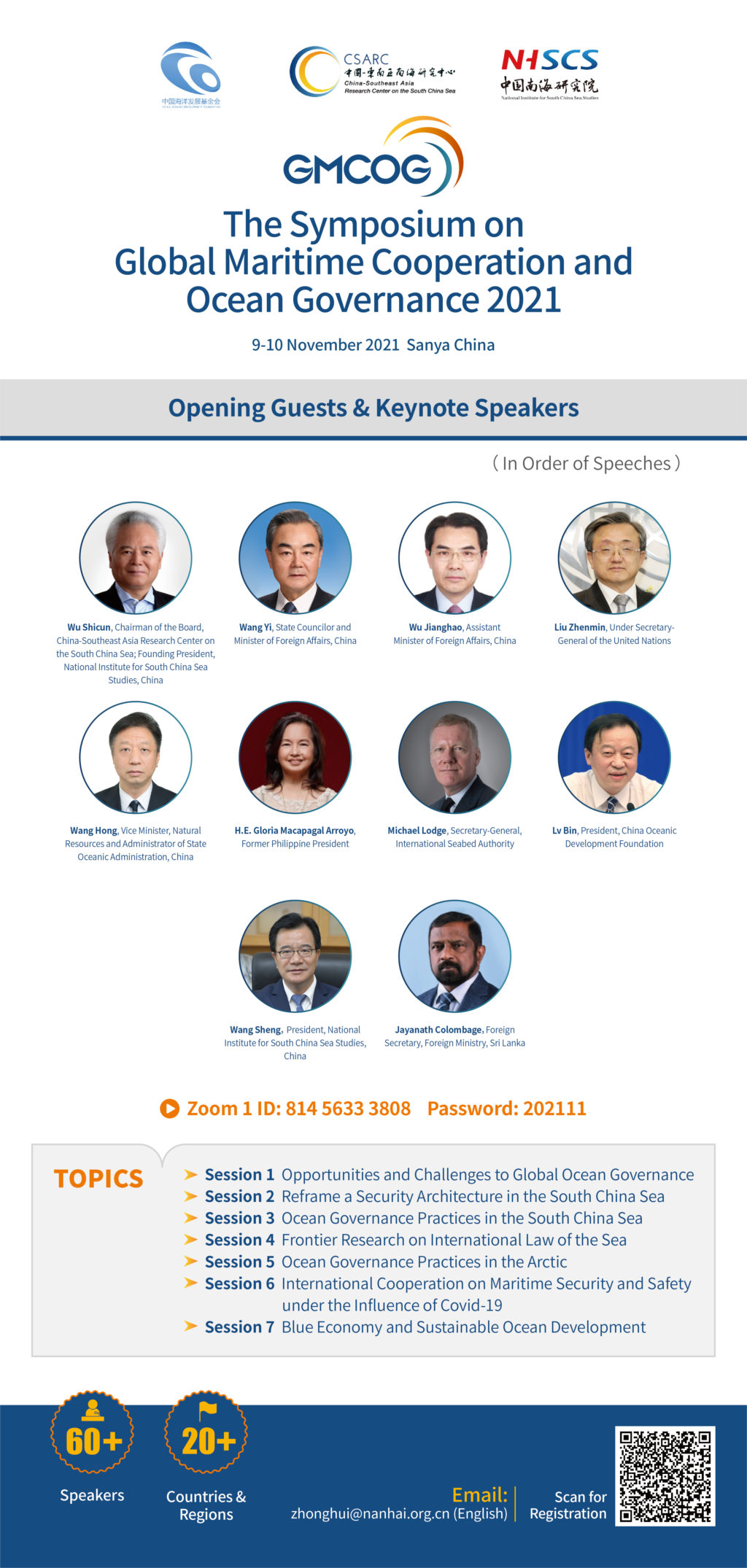EVENT SUMMARY
On November 8-9 [EDT], the hybrid-style 2021 Symposium on Global Maritime Cooperation and Ocean Governance (GMCOG) was held both in Hainan and online. The event included seven sessions and a series of keynote addresses from regional leaders and experts in their field.
Session 5: Ocean Governance Practices in the Arctic discussed the various ocean governance practices in the Arctic. The session was moderated by Professor Gordon Houlden, Director Emeritus of the China Institute at the University of Alberta Canada.
Dr. Aldo Chircop, Professor of Law at the Schulich School of Law, Dalhousie University, commenced the session with a presentation on the ocean governance considerations of low impact corridors with a particular focus on Canadian Arctic waters. He suggested that climate change is causing Arctic Canada to be both more accessible and more likely to have navigational incidents due to poor charts of the region, variations in weather, the evolving conditions, and the remote nature of the region. Nevertheless, the increasing demand for shipping through the Arctic exhibits a pressing need to form capable governance mechanisms.
Chircop introduced that Canada is currently conducting public consultations on the potential, novel designation of low impact corridors in the Northwest Passage in the interest of environment protection but also, most importantly, to protect the rights of the indigenous people to whom the region is their homeland. The Canadian approach aims at focusing on hydrographic surveys and navigational support services in the corridors to incentivize shipping to navigate safely in the corridors. Eventually, he concluded that the corridors would become subject to collaborative governance as global shipping through the Arctic continues to grow. He also underlined that the Corridor Initiative would be on a voluntary basis when the corridors are established, thus also opening up possibilities for further international cooperation.
When asked whether the Corridor Initiative might provide useful comparisons for other regions, such as the South China Sea, Chircop pointed out that the Corridor Initiative falls within an extensive body of practices on designating sea routes, including International Maritime Organization (IMO) practices and other instruments. Concerning international straits, certain bilateral issues often need to be resolved before routing designation can be discussed through IMO, and good-faith cooperation is essential. He also acknowledged that the Corridor Initiative, featuring voluntary compliance, seeks to avoid the legal status of the relevant waters while making navigation in the region more available and safe.
Dr. Nong Hong, Executive Director and Senior Research Fellow, Institute for China-America Studies, presented on the roles of non-Arctic states in the Arctic and how their policies and activities are being interpreted by the Arctic stakeholders. Hong began by introducing the Asian countries that have either been active or have declared interest in the Arctic: Japan, South Korea, China, India, and Singapore. She argued that the new geopolitical landscape of the Arctic today is a significant departure from the great power politics that existed in the region during the Cold War era. The growing activities of non-Arctic states, especially the three East Asian powers, evidence a convergence of interest and their need to have their voices heard.
Continuing, Hong introduced China’s Arctic policy in great detail. She suggested that China’s policy goals in the governance of the Arctic are shaped in four key words: understand, protect, develop, and participate. She then summarized the examples of different Arctic states’ public written perceptions of China’s increasing involvement in the Arctic, emphasizing that the perception of China’s growing involvement in the Arctic varies from being a challenger to the status quo to being a great opportunity for further regional growth. Of them all, the United States’ view on China’s Arctic policy appeared to be the most complicated. On one hand, the Biden administration appears eager to work with China to address climate change issues in the polar region. One the other hand, Washington is also concerned that China and Russia are working together to dominate the Arctic. Hong concluded that China’s emphasis on cooperation will be crucial to its relationship with other stakeholders in the years to come.
In a later discussion with other panelists, Hong noted that China has emphasized respect to international framework and respective domestic legislations when engaging in the Arctic. Cooperation and collaboration have continually been the key feature, as well as the recognition of littoral and coastal states, in mutual respect. She also proposed to Dr. Suzanne Lalonde that the U.S.-Canada partnership could have a useful impact on other bilateral engagements, to which Dr. Lalonde responded that the U.S. and Canada would be “very willing” to apply experiences from their current collaboration to other bilateral relationships.
Dr. Suzanne Lalonde, Professor of Public International Law and International Law of the Sea, University of Montreal, next presented the sustainable protection of the Arctic Ocean and how Arctic states have acknowledged the need for cooperation in the region. Lalonde highlighted the success of the U.S.-Canada collaboration over the protection of the Arctic Ocean despite sensitive, long-standing bilateral disagreements. She argued that the North American Arctic should be viewed as an example of successful maritime collaboration and concluded that such a collaboration could become a blueprint for other international cooperation over ocean governance in the Arctic.
In follow-up discussions, Chircop and Lalonde both agreed that certain gaps still remain in the U.S.-Canada partnership in the Arctic. According to Lalonde, infrastructure is the “first and foremost” field that needs further efforts and works, but other issues, such as the building of vessels, are also difficult to contend with. Chircop, in turn, highlighted the issue of lack of legal clarity as different regional and international regimes interact in the region.
Dr. Bai Jiayu, Professor at the School of Law, Nankai University, presented on Arctic Affairs cooperation among China, Japan, and South Korea. Bai suggested that with the rapid erosion of the Arctic coastlines due to climate change, the region has become more globalized. She compared the Arctic policies of these three nations and suggested that all of them emphasized the importance of aligning with international law when dealing with Arctic issues.
Bai also found that there are slightly different characteristics in the Arctic policies of the three Asian states. She suggested that China, in its Arctic policy, expressed a need to be an “active participation, builder, and contributor for Arctic Governance.” Japan has “projected itself as a maritime state with a robust polar tradition and with an extended polar identity” while South Korea “has high competition in the research and development of marine science, of shipbuilding, and of offshore plants, which gives them responsibilities, rights, and capabilities” to participate in Arctic governance. She concluded that, despite the slightly different characteristics of their Arctic policies, the three Asian states can improve the efficiency of the implementation of the policies. Their previous cooperation on issues such as Arctic climate and environment, scientific exploration, resource development, and channel utilization laid the foundation of cooperation in Arctic affairs, to further cooperate over a broad variety of Arctic governance.
Lastly, Ms. Sakiko Hataya, Research Fellow at the Ocean Policy Research Institute, Sasakawa Peace Foundation, spoke on the challenges and opportunities regarding the Northern Sea Route (NSR), using the 6-day obstruction of the Suez Canal in 2021 as a case study to evidence the need to expand global shipping routes and secure global supply chains. Hataya suggested that the NSR has been used before as a shipping route, but the volume of passages and tonnage in total has been growing slowly over the years. She also contended that the economic advantage in using the NSR over traditional routes has quickly been realized in recent years.
Hataya also introduced the development of natural resources in the Arctic Ocean, which advanced capacity building, regulations, and environmental protection needs. In this perspective, she demonstrated shipping statistics and comprehensive scenarios of Global Trade Analysis Project simulations to analyze the impact of the NSR accessibility with legal and technical issues. In addition, she introduced that research and development for eco-friendly shipping led by the maritime industry through financial instruments, such as the Green Bond, was also introduced to provide policy recommendations to advance future governance of the NSR.
When asked about Japan’s cooperation with Russia and the possibility of joint Polar Silk Road projects, Hataya noted that private Japanese companies are already actively cooperating with the Russian government over NSR. In a separate discussion, she also emphasized that the United Nations Convention on the Law of the Sea is an important standard to be followed and respected both with regard to the use of the NSR as well as other matters in Arctic governance.
[Summary written by Yilun Zhang, Research Associate & TnT Program Manager, and Amanda Jin, Research Assistant Intern]

Hosted by the China-Southeast Asia Research Center on the South China Sea (CSARC) together with the National Institute for South China Sea Studies (NISCSS) and the Institute for China-America Studies (ICAS), the Symposium on Global Maritime Cooperation and Ocean Governance (SGMCOG) 2021 was inaugurated in November 2020 when it brought together over 500 participants and audience members from different regions both online and offline. The backgrounds of participants include eminent experts and scholars from marine-related research institutes around the world, foreign diplomats based in China, heads of relevant international organizations, officials from marine-related government departments in China and other countries, and journalists from media outlets.
Program & Public Session Topics
*All times below are in EDT (GMT-4)*
Day 1 [Starting November 8 – 8PM]
Session 1: Opportunities and Challenges to Global Ocean Governance
Session 2: Reframe a Security Architecture in the South China Sea
Session 3: Ocean Governance Practices in the South China Sea
Day 2 [Starting November 9 – 8:30PM]
Session 4: Frontier Research on International Law of the Sea
Session 5: Ocean Governance Practices in the Arctic
Session 6: International Cooperation on Maritime Security and Safety under the Influence of Covid-19
Session 7: Blue Economy and Sustainable Ocean Development



